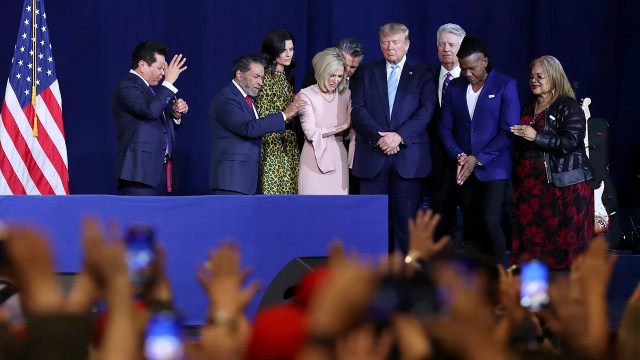
For most of the last decade, observers have been trying to understand why so many highly religious Americans have a favorable view of Donald Trump, asking how values voters can support a candidate who has been divorced twice, married three times and found liable for sexual abuse. Is Trump viewed most positively by those who might be described as “Christians in name only” – people who identify as Christians but aren’t actually religious?
The latest Pew Research Center survey sheds light on these and related questions. Here are five facts about religion and views of Trump, based on our survey of 12,693 U.S. adults conducted Feb. 13-25.
Pew Research Center conducted this analysis to explore the connection between religion and views of Donald Trump.
For this analysis, we surveyed 12,693 respondents from Feb. 13 to 25, 2024. Most of the respondents (10,642) are members of the Center’s American Trends Panel, an online survey panel recruited through national random sampling of residential addresses, which gives nearly all U.S. adults a chance of selection.
The remaining respondents (2,051) are members of three other panels, the Ipsos KnowledgePanel, the NORC AmeriSpeak panel and the SSRS opinion panel. All three are national survey panels recruited through random sampling (not “opt-in” polls). We used these additional panels to ensure that the survey would have enough Jewish and Muslim respondents to be able to report on their views.
The survey is weighted to be representative of the U.S. adult population by gender, race, ethnicity, partisan affiliation, education, religious affiliation and other categories.
For more, refer to the ATP’s methodology and the methodology for this survey.
Among religious groups, White evangelical Protestants continue to have the most positive opinion of Trump. Overall, two-thirds of White evangelical Protestants say they have a favorable view of the former president, including 30% who have a very favorable opinion of him.
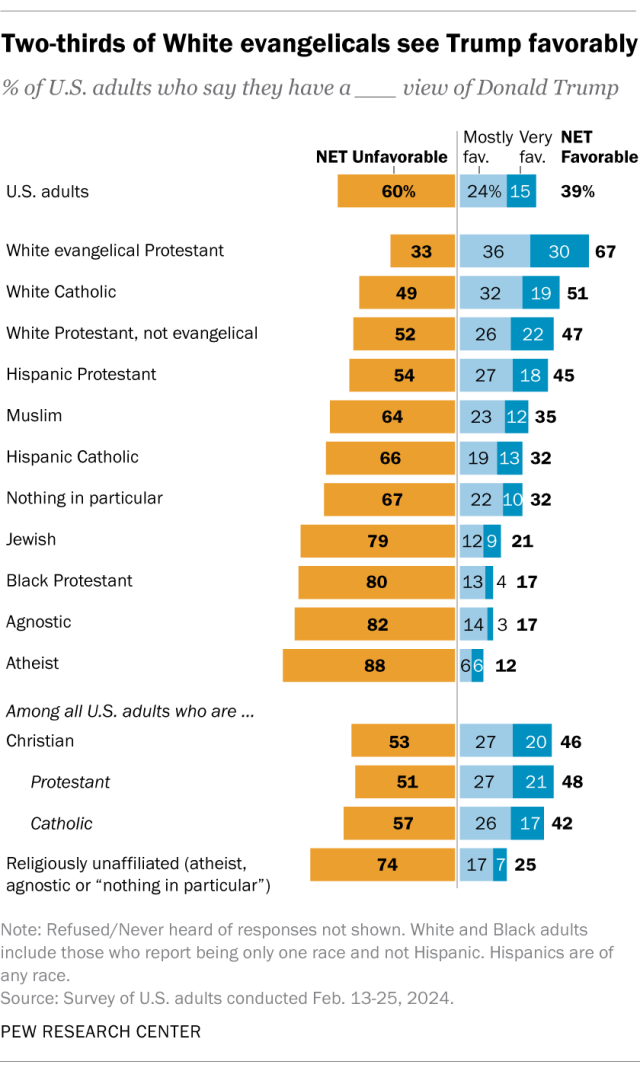
Roughly half of White Catholics (51%) express positive views of Trump, as do 47% of White nonevangelical Protestants and 45% of Hispanic Protestants.
But in every other U.S. religious group large enough to be analyzed in this survey, large majorities have unfavorable opinions of Trump, including:
- 88% of atheists
- 82% of agnostics
- 80% of Black Protestants
- 79% of Jewish Americans
These religious patterns largely reflect partisan differences. Most White evangelicals tend to vote for Republicans, as do smaller majorities of White Catholics and White nonevangelical Protestants. By contrast, most atheists, agnostics, Black Protestants and Jews tend to vote for Democrats.
Trump’s favorability rating is similar among Christians who attend church regularly and those who don’t. Some observers have pointed out that Trump’s political base consists largely of people who call themselves Christians but don’t go to church. However, our survey shows that Christians who regularly go to church express equally favorable views of Trump as those who don’t often attend religious services.
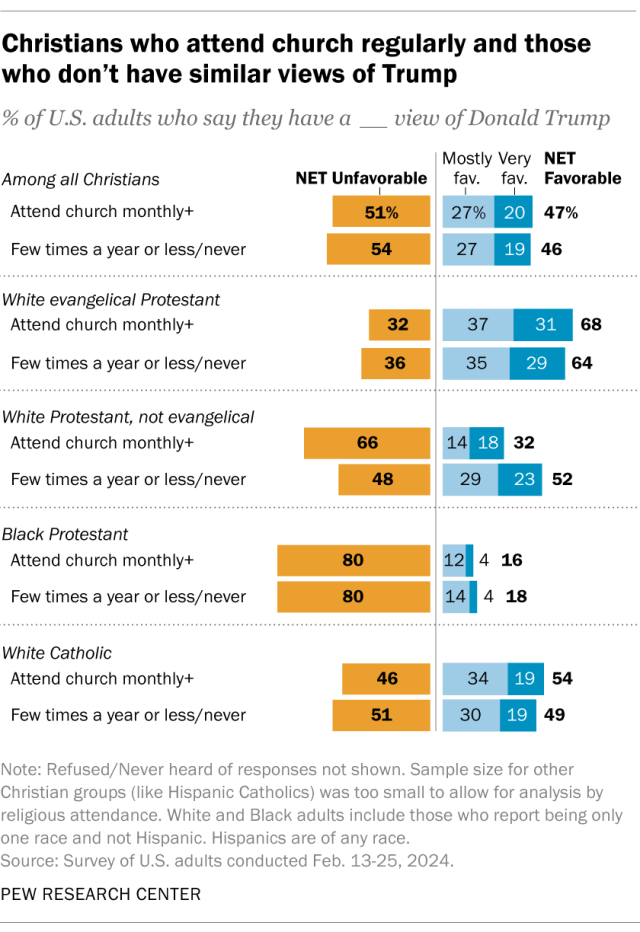
Among Christians as a whole, 47% of those who attend church at least monthly say they have a favorable view of the former president. That’s on par with the 46% of non-church-attending Christians who say the same.
Among White evangelical Protestants, 68% of regular churchgoers have a positive view of Trump – similar to the 64% among White evangelicals who don’t attend church regularly.
The only exception to this pattern is among White Protestants who do not identify as born-again or evangelical. In this group, Trump is viewed more favorably by those who don’t attend church regularly than by those who do (52% vs. 32%).
Many of the people who view Trump favorably don’t go to religious services regularly – but very few are nonreligious. Overall, 64% of respondents who have a favorable view of Trump say they attend religious services a few times a year or less often, while 35% say they go to services at least once or twice a month. (Among all respondents, 69% say they attend religious services a few times a year or less, while 30% go at least monthly.)
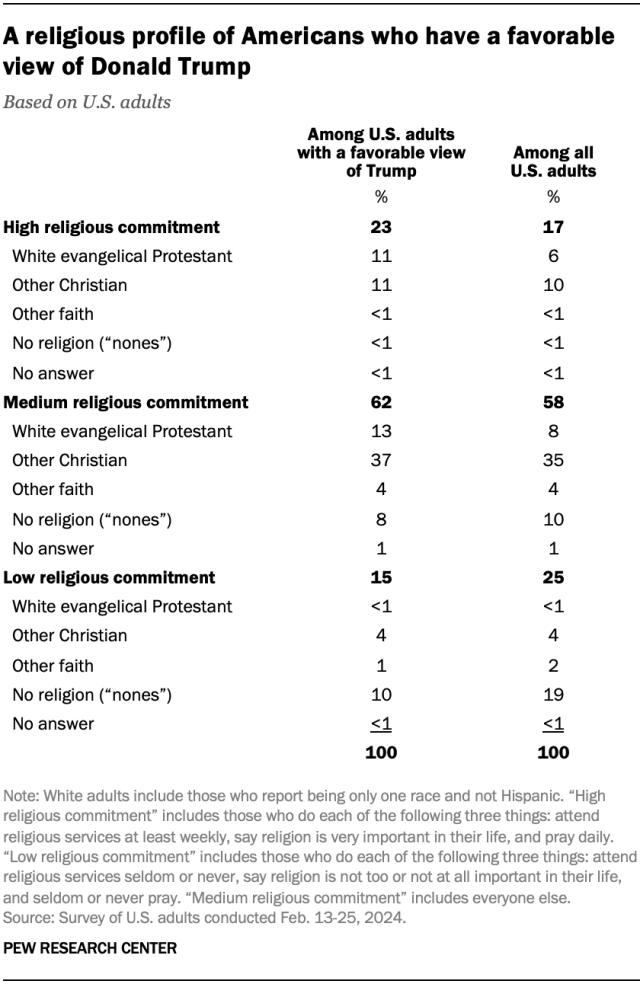
Religious attendance is just one way of looking at religious commitment. Another common way we measure it is to combine survey questions about attendance at religious services, how often people pray and how important religion is to them.
U.S. adults who attend religious services at least weekly, pray daily and say religion is very important in their lives are categorized as highly religious. Those who seldom or never attend services, seldom or never pray and say religion is not too important or not at all important in their lives are counted as having low religious commitment. Everyone else is counted as having medium religious commitment.
Looked at this way, 23% of U.S. adults with a favorable view of Trump are highly religious, including 11% who are highly religious White evangelical Protestants.
Another 62% of Americans with a favorable view of Trump have medium levels of religious commitment, including 13% who are White evangelicals.
Just 15% of people with a favorable view of Trump have low levels of religious commitment. By far the biggest subgroup within this category is religious “nones” – people who describe their religious identity as atheist, agnostic or “nothing in particular.” Overall, 18% of people with a positive view of Trump are religious “nones,” including 10% who are “nones” with low levels of religiousness.
Very few of the people who have a positive view of Trump are White evangelical Protestants with a low level of religiousness. Indeed, self-described White evangelical Protestants who are not religiously observant account for less than 1% of the overall U.S. population. Even if a candidate wanted to form a coalition rooted in support from nonreligious evangelicals, there just aren’t enough of them to be a national political base.
Most people who view Trump positively don’t think he is especially religious himself. But many think he stands up for people with religious beliefs like theirs. Just 8% of people who have a positive view of Trump think he is very religious, while 51% think he is somewhat religious and 38% say he is not too or not at all religious.
But 51% of those with a favorable view of Trump think he stands up for people with religious beliefs like their own, including 24% who think he does this a great deal and 27% who say he does this quite a bit.
Among White evangelical Protestants with a favorable view of Trump, just 9% view him as very religious. But roughly two-thirds think he does a great deal (32%) or quite a bit (35%) to stand up for people with religious beliefs like theirs.
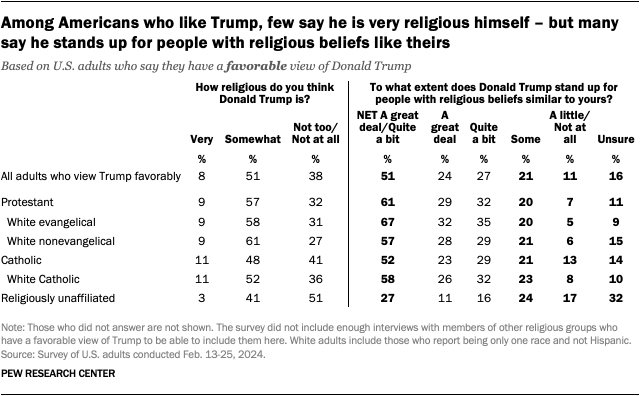
Religious “nones” who are culturally Christian view Trump a bit more positively than religious “nones” who aren’t.
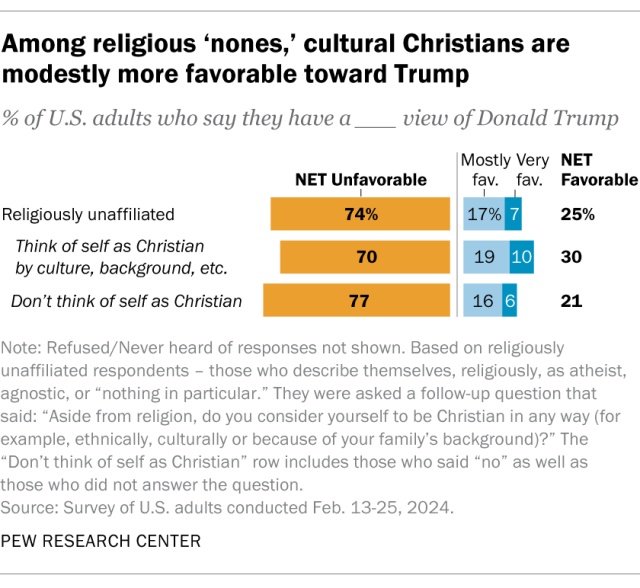
One way to measure for differences between “cultural” and “practicing” Christians is to compare Christians who do and don’t do go to church regularly, as we did above. Another is to look at religiously unaffiliated respondents, or “nones” – people who describe themselves, religiously, as atheist, agnostic, or “nothing in particular.” In our new survey, we asked these Americans whether they think of themselves as Christians “aside from religion … for example ethnically, culturally or because of your family’s background.”
Religious “nones” who identify as culturally Christian have a modestly more favorable opinion of Trump than “nones” who do not identify as Christian in any way. Still, large majorities in both groups express negative views of the former president.
